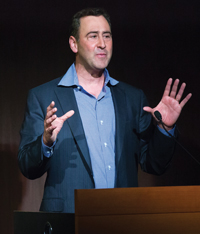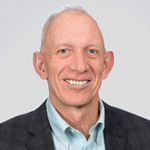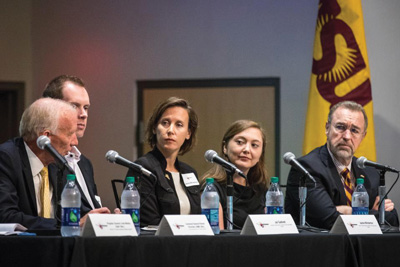2019 Graduate Education | International Affairs
THIS GUIDE IS NO LONGER ACTIVE. For the current FP Guide, click here.
Arizona State University, Center on the Future of War
Big ideas are the focus of Arizona State University’s Master of Arts in Global Security, a fast-growing online program offered by ASU’s School of Politics and Global Studies. The MA program, launched two years ago, is supported by the Center on the Future of War, a partnership between ASU and New America, a Washington, D.C.–based think tank.

Daniel Rothenberg
“We’re not teaching technical skills,” says Daniel Rothenberg, co-director of the online MA program and the Center on the Future of War. “We really believe in education as transformative.”
Big ideas can help professionals in a variety of fields advance in their careers. For example, the concept of proportionality from the law of war—that one should apply only the amount of military force necessary while fully respecting the core commitment to protecting civilians from harm—can be applied in many contexts, from business strategy to banking regulations.
To help students explore such ideas, the MA in Global Security program has tapped a retired Marine Corps three-star general who flew combat operations in Iraq and Bosnia—and has a PhD in philosophy. While on active duty, Lt. Gen. (Ret.) Robert E. Schmidle Jr. also helped set up the United States Cyber Command and served as its first deputy commander. Now retired from military service, he is an ASU professor and helps direct the new Cybersecurity Concentration within the MA program.

“Ideas influence and impact strategy. Anyone interested in global security should understand how the underlying foundations of our beliefs guide our actions.” –Lt. Gen. (Ret.) Robert E. Schmidle Jr., U.S. Marine Corps, Professor of Practice, MA in Global Security program, Center on the Future of War, Arizona State University
Schmidle says the government, the military, the private sector, and civil society groups all need professionals who have two key skill sets: critical thinking and technological savvy.
The first, critical thinking, is crucial for making responsible choices, Schmidle says. “Ideas influence and impact strategy. Anyone interested in global security should understand how the underlying foundations of our beliefs guide our actions,” he explains. “The MA in Global Security seeks to empower students to be more confident, critical, and engaged thinkers.”
Second, today’s professionals must understand the underlying principles of key technologies: Schmidle believes that, just as pilot training begins with learning the principles of aerodynamics, government officials, business leaders, and anyone engaging the cyber domain must have a basic sense of how the technology works and understand key ideas about its vulnerabilities, risks, and capabilities.
“It is essential that early- to mid-career professionals gain a foundational understanding of the technologies involved in the domain of cyber,” Schmidle says. “This is crucial for guiding all levels of professional cyber engagement, from operational plans all the way to strategic vision.”

Panelists discussing modern cybersecurity listen to retired Lt. Gen. Robert Schmidle at the ASU Congressional Cybersecurity Conference.
Studying big ideas paid off for Mike Fior, who enrolled in the MA program when he was close to retirement from the U.S. Marine Corps and had 14 years of experience as a counterintelligence agent. After completing the MA, he landed a job with one of the nation’s largest energy companies, and he was promoted within the company less than a year later.
“The MA program has provided me with a fundamental theoretical base in global security that I feel is invaluable in my profession,” Fior says.
The MA in Global Security attracts students ranging from military officers to recent college graduates to seasoned international affairs professionals. The online format allows students to participate from anywhere, even while deployed in conflict zones. The degree can be completed in as little as 12 months or as many as six years. Most students in the MA in Global Security program study while working either full-time or part-time.
Visit the Request Info page to receive more information.
Contents
- 2019 Graduate Education | International Affairs
- UC San Diego School of Global Policy and Strategy
- NYU School of Professional Studies, Center for Global Affairs
- Johns Hopkins University School of Advanced International Studies (SAIS)
- The Fletcher School at Tufts University
- Arizona State University, Center on the Future of War
- University of Notre Dame, Keough School of Global Affairs
- Seton Hall University, School of Diplomacy and International Relations
- Syracuse University, Maxwell School of Citizenship and Public Affairs
- University of Kent, Brussels School of International Studies
- Fordham University, Graduate Program in International Political Economy and Development (IPED)